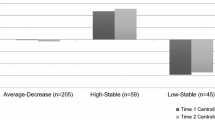This article ethnographically examines the relationship between success, racial identity, and racial formation among Korean students in one New Jersey public high school. Using Racial Formation theory (Omi & Winant, [1986. Racial formation in the United States from the 1960s to the 1990s. New York: Routledge]; Winant, [1994. Racial conditions: Politics, theory, comparisons. Minneapolis, MN: University of Minnesota Press]), the author demonstrates how students at this particular high school use competing racial projects of neutrality and visibility to embrace and/or contest the dominant, white notion of what it means to be an academically successful student. The findings emphasize the need to look beyond cultural explanations of success and failure to include an analysis of the ways that schools themselves affect the constantly shifting terrain of racial formation.
Similar content being viewed by others
References
Breen M., (2004). The Koreans. Who they are, what they want and where their future lies Thomas Dunne Books, St. Martin’s Press New York
Brown M. K., Carnoy M., Currie E., Duster T., Oppenheimer D. B., Shultz M. M., et al., (2005). White washing race. The myth of a color blind societyUniversity of California Press Berkley and Los Angeles
Buzo A., (2002). The making of modern KoreaRoutledgeLondon and New York
Eckert P., (1989). Jocks & burnouts: Social categories and identity in the high schoolTeachers College PressNew York
Fordham S., (1996). Blacked out: Dilemmas of race, identity, and success at Capital HighUniversity of Chicago PressChicago
Fordham S., Ogbu J., (1996). Black students’ school success: Coping with the burden of ‘acting white’The Urban Review 18:176–206
Gibson M., (1998). Accommodation without assimilation: Sikh immigrants in an American high schoolCornell University PressIthaca, New York
Goto, S. (1994, April). Nerds, normal people, and homeboys: Asian American students and the language of school success. (ERIC Document Reproduction Service No. 371090)
Lee S., (1994). Behind the model-minority stereotype: Voices of high and low achieving Asian American studentsAnthropology and Education Quarterly 25(4):413–429
Lee S., (2001). More than model minorities or delinquents: A look at Hmong American high school studentsHarvard Educational Review 71(3):505–527
Lee S., (2004). Up against whiteness: Students of color in our schoolsAnthropology and Education Quarterly 35(1):121–125
Levinson B., (2001). We are all equal: Student culture and identity at a Mexican secondary school, 1988–1998Duke University PressDurham, NC
Levinson, B., Foley, D., & Holland, D. (Eds.). (1996). The cultural production of the educated person: Critical ethnographies of schooling and local practice. Albany: State University of New York Press
Lew J., (2004). The ‘other’ story of model minorities: Korean American high school dropouts in an urban contextAnthropology and Education Quarterly 35(3):303–323
Lutrell W., (2002). Pregnant bodies, fertile minds: Gender, race and the schooling of pregnant teensRoutledgeNew York
Lykx A., (1999). The citizen factory: Schooling and cultural production in BoloviaState University of New York PressAlbany
Ogbu J., (1998). Voluntary and Involuntary Minorities: A cultural ecological theory of school performance with some implications for educationAnthropology and Education Quarterly 29(2):155–188
Ogbu J., (2003). Black students in an affluent suburb: A study of academic disengagementLawrence ErlbaumMahwah, NJ
Omi M., Winant H., (1986). Racial formation in the United States from the 1960s to the 1990sRoutledge New York
Perry P., (2002). Shades of white: White kids and racial identities in high schoolDuke University PressDurham, NC
Pollack M., (2004). Colormute: Race talk dilemmas in an American schoolPrinceton University PressPrinceton, NJ
Pollack M., (2004). Race bendingAnthropology and Education Quarterly35(1):30–52
Tuan M., (1998). Forever foreigner or honorary whites: The Asian ethnic experience todayRutgers University PressNew Brunswick, NJ
Varenne H., McDermott R., (1998). Successful failure: The school America buildsWestview PressBoulder
Wade P., (1997). Race and ethnicity in Latin AmericaPluto PressLondon
Winant H., (1994). Racial conditions: Politics, theory, comparisonsUniversity of Minnesota PressMinneapolis, MN
Wu F., (2002). Yellow: Race in America beyond black and whiteBasic BooksNew York
Yu E.-Y., Choe P., Han S. I., (2002). Korean population in the United States: Demographic characteristics and socio-economic statusInternational Journal of Korean Studies 4(1):71–107
Acknowledgments
I would like to thank George Bond, Lambros Comitas, Charles Harrington and Hervé Varenne for feedback on earlier versions of this article. In addition I thank the students of the Anthropology Colloquium at Teachers College, Columbia University for their comments and support. I would like to give special thanks to Lesley Bartlett for her constant advice, encouragement and insights throughout all phases of this project. Finally, I would like to thank Soo Ah Kwon, Bryan Brayboy, and anonymous readers at the Urban Review for their feedback.
Author information
Authors and Affiliations
Corresponding author
Additional information
Melissa Marinari is a PhD candidate at Teachers College, Columbia University in the Department of International and Transcultural Studies. She has also been a high-school teacher of Spanish since 1992
Rights and permissions
About this article
Cite this article
Marinari, M. Racial Formation and Success among Korean High School Students. Urban Rev 37, 375–398 (2005). https://doi.org/10.1007/s11256-005-0019-x
Published:
Issue Date:
DOI: https://doi.org/10.1007/s11256-005-0019-x



